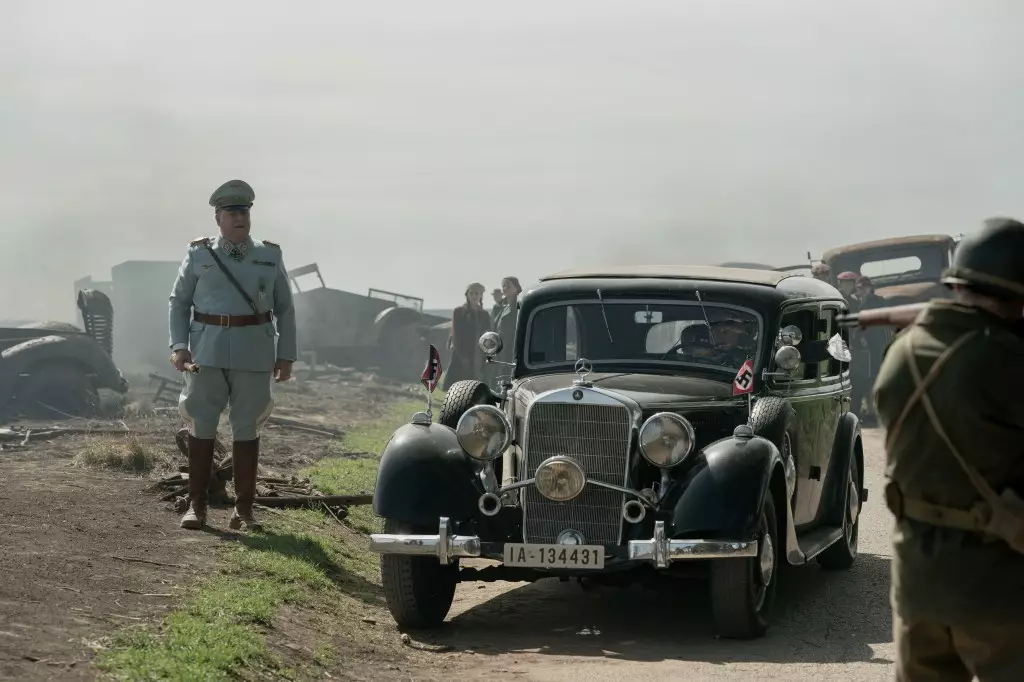In an era where the fabric of society often grapples with moral ambiguity, the film “Nuremberg,” under the adept direction of James Vanderbilt, lands not merely as a historical recount but as a grave reminder of the importance of justice. This film, which Sony Pictures Classics has acquired for its North American and worldwide airline rights, is set against the haunting backdrop of post-World War II trials that sought to bring Nazi war criminals to accountability. Its relevance today cannot be overstated, as the core questions surrounding justice, accountability, and human psyche remain persistently perplexing.
The film is based on Jack El-Hai’s compelling book, “The Nazi and the Psychiatrist,” and features a star-studded cast including Oscar winners Russell Crowe and Rami Malek, as well as nominee Michael Shannon. This artistic endeavor is not merely recounting a historical event; it’s delving deep into the human psyche during a time marked by unimaginable horror. Crowe embodies Hermann Göring, a central figure in the Nazi hierarchy, while Malek takes on the role of American psychiatrist Douglas Kelley, a man wrestling with the moral implications of determining whether these figures are fit to stand trial for their crimes.
The Dichotomy of Justice and Vengeance
Nuremberg probes the delicate balance between justice and vengeance, a theme that resonates profoundly today. Vanderbilt himself reflects on this urgency, stating, “Nuremberg explores the fragile boundary between justice and vengeance in the aftermath of unimaginable atrocity.” In the face of atrocities, societies often react through a dual lens—one that seeks justice and another that seeks retribution. The film promises to evoke a spectrum of emotions, compelling audiences to examine their own beliefs about justice, echoing the sentiments of obfuscation that many feel in today’s world.
This interplay of justice and morality is where the film finds its weight. The 80th anniversary of the trials serves as a poignant reminder that history often repeats itself. With rising discussions surrounding war crimes and human rights, Nuremberg could not arrive at a more relevant time. By showcasing the multifaceted struggle of characters like Kelley, who literally stands at the intersection of psychological assessments and moral implications, the film underscores a significant yet often overlooked aspect of judicial proceedings—what happens when the identifiers of “good” and “evil” become murky?
A Talented Ensemble Delivering Powerful Performances
An integral part of the film’s appeal lies in its carefully curated cast. Russell Crowe and Rami Malek not only embody their roles but also offer nuanced performances that promise to leave a lasting impression on viewers. Michael Shannon, with his unpredictable intensity, adds a layer of complexity, ensuring that the film’s narrative is rich in character dynamics. Featuring actors like Richard E. Grant and Leo Woodall, the film boasts a lineup that emphasizes talent across the spectrum, thereby enhancing its narrative depth.
Vanderbilt’s previous work, including the gripping film “Truth,” shows his adeptness at turning real-life stories into compelling cinematic experiences. His writing indicates a profound understanding of dramatic tension, which promises to take audiences on an emotional rollercoaster. “Nuremberg” is positioned not just as a film to observe but as a dialogue starter on the nature of humanity during crises—a thought-provoking exploration of the psychological and social implications of war crimes.
A Bold Venture in Film Financing
The financial backing from Bluestone Entertainment, Walden Media, and Széchenyi Funds further cements “Nuremberg” as a serious cinematic endeavor. The project, developed for over a decade, stands testament to the resilience of storytelling. Such commitment underscores the belief that narratives centered around human rights and justice must be told rigorously and authentically. As audiences prepare to witness this film, it’s significant to recognize that its journey reflects not only the intricacies of filmmaking but also a motivated desire to engage with vital societal issues.
“Nuremberg” stands to be more than just a film about historical trials; it presents itself as an urgent reflection on societal justice, the complexity of human motivation, and the dread of living through yet another cycle of atrocity. Its release on November 7 not only commemorates a critical moment in history but also challenges audiences to contemplate the fragility of justice and to engage actively with the historical narrative that still echoes today.
